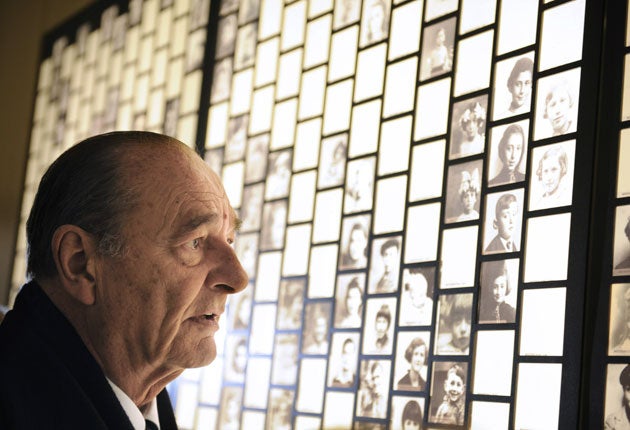Chirac lawyers to cite Alzheimer's in attempt to postpone fraud trial

Your support helps us to tell the story
From reproductive rights to climate change to Big Tech, The Independent is on the ground when the story is developing. Whether it's investigating the financials of Elon Musk's pro-Trump PAC or producing our latest documentary, 'The A Word', which shines a light on the American women fighting for reproductive rights, we know how important it is to parse out the facts from the messaging.
At such a critical moment in US history, we need reporters on the ground. Your donation allows us to keep sending journalists to speak to both sides of the story.
The Independent is trusted by Americans across the entire political spectrum. And unlike many other quality news outlets, we choose not to lock Americans out of our reporting and analysis with paywalls. We believe quality journalism should be available to everyone, paid for by those who can afford it.
Your support makes all the difference.Former French president Jacques Chirac may have Alzheimer's disease – raising doubts over his capacity to face a corruption trial next month – a Paris newspaper said yesterday.
Defence lawyers are expected to use a procedural hearing today to seek a postponement of Mr Chirac's trial for, in effect, embezzling Paris taxpayers' money to fund his political career in the early 1990s. The health of the former president, 78, will not be formally raised at the hearing. There has, however, been pressure by Mr Chirac's friends and former colleagues for the infirm ex-president to be spared a three-week ordeal starting on 7 March in the Paris court-room where Queen Marie-Antoinette was arraigned in 1793.
There have been rumours and hints about Mr Chirac's health for more than a year but the Journal du Dimanche devoted its first three pages yesterday to a report headed: "Jacques Chirac faces his last battle". Several unnamed close friends of Mr Chirac were quoted as saying that he was "declining" and a "shadow of the great Chirac I knew". Mr Chirac's wife, Bernadette, was said by one friend to "have used the word Alzheimer's in my presence".
Alain Minc, a political essayist and close adviser to President Nicolas Sarkozy, accused the newspaper of an "ethical transgression" for talking in such detail about the health of a private person, against the letter and spirit of the French law which protects private life. Other commentators suggested that the Chirac clan had clearly co-operated with the articles as part of a concerted campaign to have the trial delayed indefinitely.
Mr Chirac, president from 1995 to 2007, appeared in public in Orleans last week at the opening of a museum dedicated to French Jewish children murdered in the Holocaust. He limped and appeared tired but also greeted children and old friends, warmly.
In the Journal du Dimanche article, friends of Mr Chirac said that he had moments when he was his normal self and times when he could not remember old acquaintances or simple facts. One friend was quoted as saying: "Sometimes he goes completely off the rails and repeats things over and over, like 'Fillon, what is he doing now?'" François Fillon was a minister in successive Chirac administrations. He has been Mr Sarkozy's Prime Minister since 2007.
The newspaper said that doubts about the ex-president began almost exactly one year ago when he attended a concert in Paris given by the internationally celebrated violinist Anne-Sophie Mutter. The ex-president stood up during the performance several times and said loudly: "What am I doing here?" or "who is this Madame Moutarde [Mrs Mustard]"?
Old political friends of Mr Chirac have been suggesting for months that his trial is unnecessary. Even former political enemies, such as Arnaud Montebourg, a Socialist politician, say that Mr Chirac should be forgiven any alleged wrong-doing to thank him for having "kept France out of the Iraqi furnace in 2003".
The ex-president faces two separate charges that, while mayor of Paris, he used city taxpayers' funds to help finance his centre-right political party. The accusations, although seemingly trivial in themselves, form part of a much wider alleged network of illegal funding of the now defunct Rassemblement pour la République in the 1980s and 1990s. The RPR's successor party, Mr Sarkozy's UMP (Union pour un Mouvement Populaire) has refunded more than €2m (£1.7m) to Paris town hall.
The ill-health defence
Richard Nixon
The former US president was excused from testifying at a trial relating to Watergate after he developed a life-threatening blood clot. As a result, he never testified about the scandal under oath. He lived another 20 years.
Slobodan Milosevic
The ousted Serbian president's UN-backed trial for genocide and crimes against humanity was interrupted when doctors announced he was suffering from high blood pressure. He died of a heart attack the following year.
Ieng Sary
Lawyers for Mr Sary, a member of the Khmer Rouge, asked earlier this month for his attendance at Cambodia's genocide tribunal hearings to be limited because of his 'age and ill health'. Up 2.5 million people are believed to have died under the Khmer Rouge regime.
Join our commenting forum
Join thought-provoking conversations, follow other Independent readers and see their replies
Comments